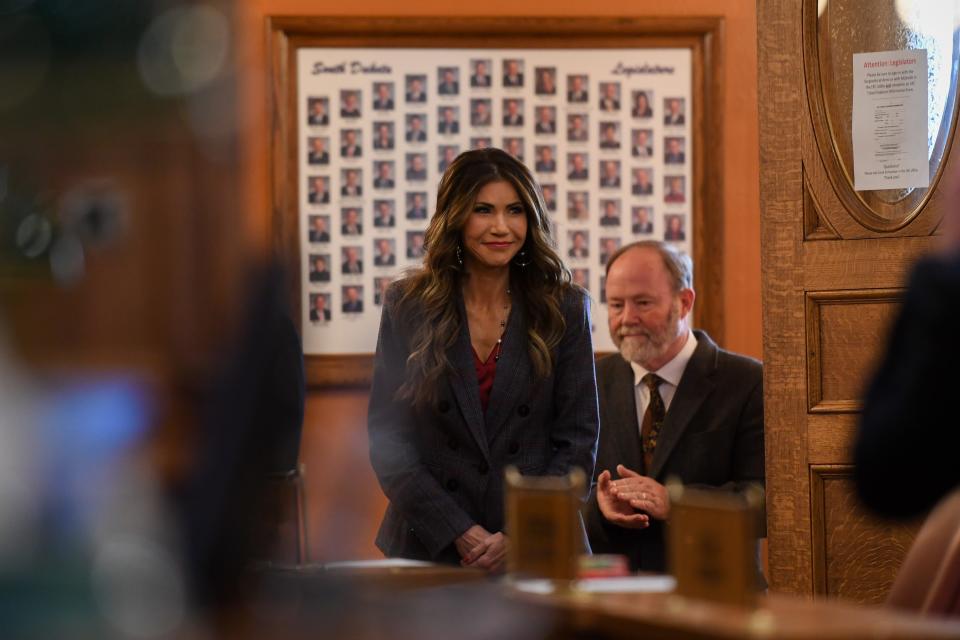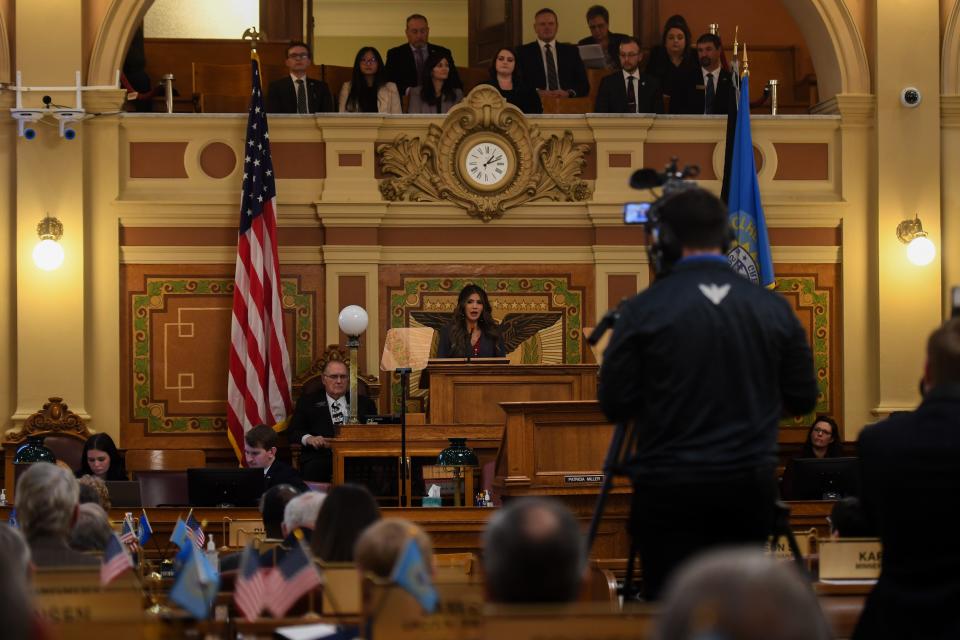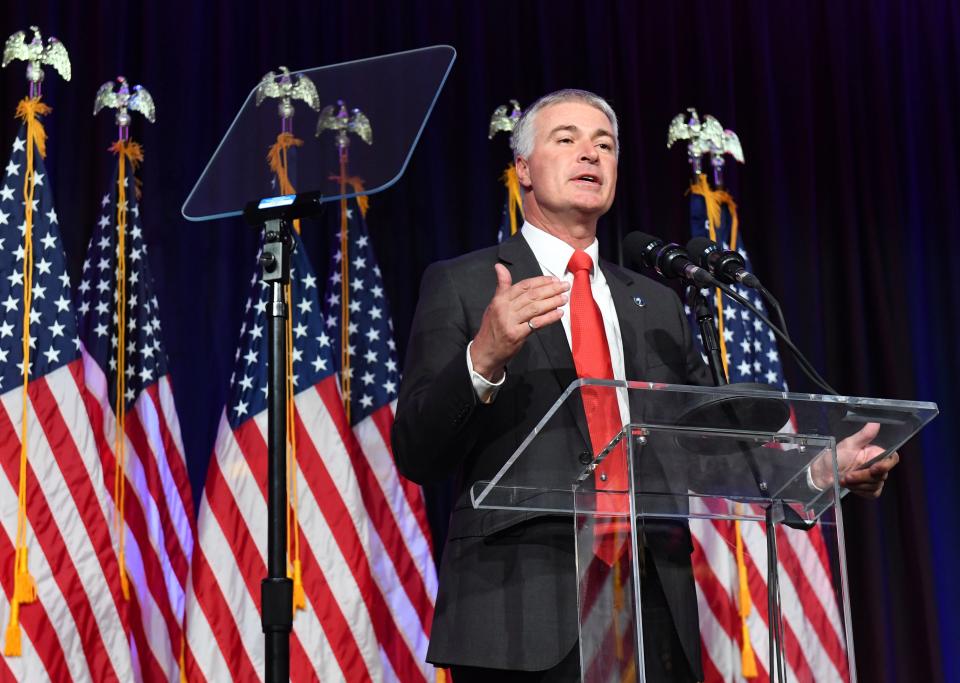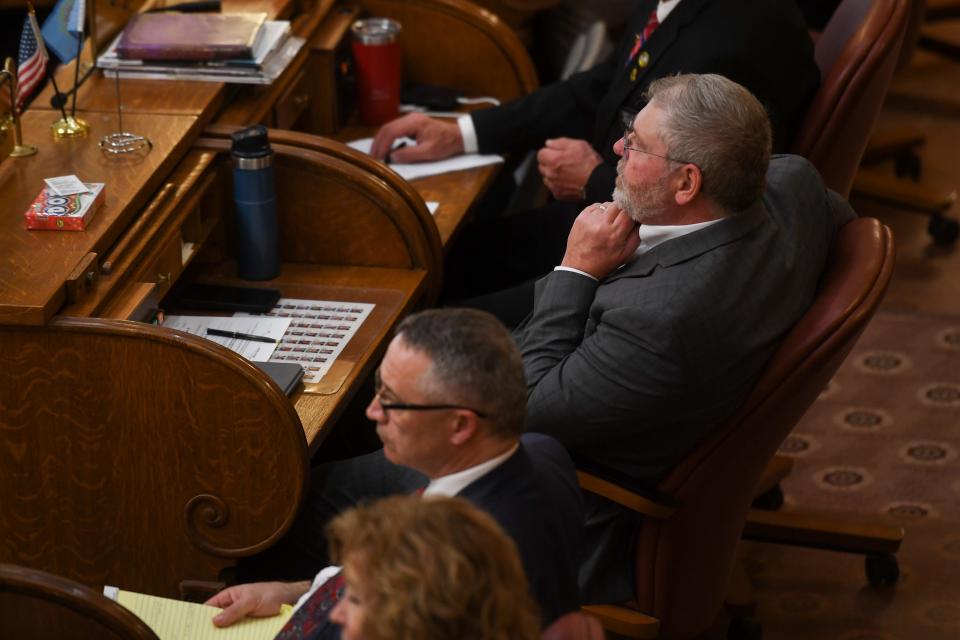New briefs details South Dakota officials' questions about conflict of interest clause
- Oops!Something went wrong.Please try again later.
The South Dakota Governor, Attorney General and Legislature have sent briefs to the South Dakota Supreme Court so that the justices can issue clearer guidance on the state constitution’s contract clause.
Gov. Kristi Noem had requested the Supreme Court issue an advisory opinion back in late October with the support of AG Marty Jackley and top lawmakers. The request came after former Sen. Jessica Castleberry, R-Rapid City, resigned following an investigation that found she had improperly received COVID-19 federal stimulus loans for her daycare business, violating the state constitution.

The contract clause, also known as Article III, section 12, in the state constitution, reads “Any member of the Legislature during the term for which he shall have been elected, or within one year thereafter, be interested, directly or indirectly, in any contract with the state or any county thereof, authorized by any law passed during the term for which he shall have been elected.”
Noem issued a handful of questions to the justices to rule on including if sitting lawmakers could receive foster care benefits, if their spouses were subject to the contract clause and if the lawmaker can be employed by a county or school district.
Noem’s brief tackled the definition of indirect within the nine questions she sent to the justices Jackley's brief found some of Noem’s questions depended on a case-by-case basis, and the Legislative brief argued lawmakers weren’t in violation of the contract clause if the funds came through the General Appropriations bill.
More: Noem, AG, lawmakers seek clarity on what an 'indirect' contract benefit is
Ron Parsons, the attorney appointed for the Legislature, requested the Supreme Court issue an opinion soon since at least a quarter of the Legislature could be impacted by the ruling.
The overly broad nature of the contract clause “is a potential crisis that could impact the entire government,” he wrote.
And until the Supreme Court reaches a decision, Noem has said she will not appoint two people to fill legislative vacancies after the resignation of Castleberry and Rapid City Republican Rep. Jess Olson.
Gov. Kristi Noem's brief: 'Ambiguity' may prohibit contracts with major companies
The Governor’s Office brief, compiled by Noem’s legal counsel Katie Hruska, examines each of the nine questions Noem sent to the Supreme Court.
Without guidance from the court, Hruska argued it could be detrimental to the state’s ability to follow through on contracts with publicly traded companies who may not be aware if one of their shareholders is a sitting lawmaker who could benefit from the contract.
“Such ambiguity may be detrimental to the state’s ability to contract with major publicly traded companies,” according to the brief.

The Governor’s attorney argued sitting lawmakers whose businesses receive Medicaid reimbursements are not in violation of the conflict of interest clause since it’s an insurance payment.
But the conflict of interest and indirect benefit definition become complicated when examining where lawmakers’ spouses fit into the equation. Hruska gave conflicting examples from Oklahoma and Michigan, where in Oklahoma contracts between the state and the spouse are considered an indirect conflict of interest but in Michigan, the state will allow a contract with a legislative spouse.
More: Rapid City senator resigns after she violated constitution for accepting COVID-19 funds
Attorney General Marty Jackley's brief: South Dakota should have test to determine whether lawmakers would breach conflict of interest clause
Paul Swendlund, the solicitor general, wrote in the Attorney General’s brief that on the local level, there has been some guidance as to what constitutes a direct or indirect benefit. The local guidance looks at if a local official has a vested interest in a contract that would influence them into voting for it.
“A public officer in the discharge of his duties as such should be absolutely free from any influence other than that which may directly grow out of the obligations he owes to the public at large,” according to the brief.

Additionally, lawmakers aren’t barred from entering into all contracts, according to the brief, only contracts “authorized” by a law while the lawmakers were in office.
Swendlund argues for using a test for whether a lawmaker is in breach of the Constitution by entering into a contract.
“If a contract between a legislator and the state or a county in South Dakota could be entered into using non-state or non-appropriated funds – such as if a contract were paid from a continuing appropriation or from federal funds, federal grants or private donations – then such a contract should not violate Article III, Section 12,” according to the brief.
More: South Dakota legislator’s conflict of interest puts meaning of ‘indirect’ under microscope
For lawmakers who may be employed or have stock holdings in a business, the conflict of interest clause is a case-by-case basis and depends on a variety of factors. Lawmakers can also be employed by municipalities or school districts and not be in violation of the conflict of interest clause, according to the brief.
As for spouses and families, it depends on the circumstances.
“A legislator’s ‘interest’ in family member contracts is primarily a function of the potential financial benefit realized, directly or indirectly by the legislator. A financial benefit to a spouse is most likely to inure to the benefit of a legislator,” according to the brief.
South Dakota Legislature: Contracts as part of general appropriations bill shouldn't violate conflict of interest clause
Ron Parsons, the attorney for the Legislature, argued in his brief filed Wednesday that sitting lawmakers wouldn’t be in violation of Article III if their contract with the state was part of the general appropriations bill. But if the contract was part of a special appropriation, the lawmaker would violate the constitution.
Parson and the Legislature’s argument hinged on the nature of the general appropriations bill, passed each year to fund South Dakota state departments and agencies. Because the bill sets up blanket appropriations, lawmakers don’t authorize specific contracts for each state department or agency.

“Deciphering meaning beyond the stated expenditure amounts in a general appropriations bill is not possible,” Parsons wrote.
Instead, if a department or agency has a specific project that needs to be funded, lawmakers will vote on a special appropriation. The special appropriation also requires a two-thirds vote of the House and of the Senate.
In keeping with the original meaning of the Contract Clause, Parson’s argued that special appropriations are authorized by lawmakers and provides funding for a specific project that a sitting lawmaker could have a direct or indirect interest in.
More: South Dakota lawmakers must list all conflicts of interest ahead of Supreme Court opinion
Overall, Parsons argued lawmakers can receive retirement compensation and foster care payments as well as work for a state, county, city or school district. The contract clause also doesn’t apply to lawmakers’ spouses except on a case-by-case basis of whether the spouse entered into a contract based on a law passed during the legislative session.
He took a more nuanced approach on if lawmakers who own a business could enter into a subcontract with the state and if lawmakers own shares of stocks of a business that had a contract with the state. The examples provided, Parsons wrote, could be considered an indirect interest.
The next legislative session starts Jan. 9.
This article originally appeared on Sioux Falls Argus Leader: South Dakota officials post conflict of interest questions to supreme court

